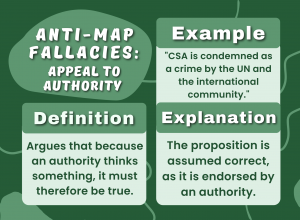Debate Guide: It's wrong because it's illegal

Adult-minor sex is wrong, period! Most societies rightly condemn and criminalize it, so how can it be OK?
Nothing is wrong just because it's illegal, and besides, ages of consent are highly variable geographically and over time. This is because law is an evolving system of codified moral standards, which vary according to the place on earth, time in history, and on whether or not laws are used. Laws, being written before the act and involving nothing more than subjective judgments, have no ethical authority over the rightness of any practice. One example that demonstrates this is miscegnation, but lets instead cover gay sex:
According to your opponent's very basic legalistic morality, gay sex has gone from being 'wrong' to 'more/totally acceptable' in a number of recent societies, as the laws changed and were eventually equalized. Gay sex would also be wrong in some present societies that outlaw it, but not elsewhere! If the circular reasoning of "illegal = wrong = illegal" was a vaild argument, all forms of deregulation would automatically be immoral and irresponsible. There would be no acceptable reason for the legalization of any human behavior; i.e. we would all be living in an authoritarian dictatorship by the time a few governments had been given the chance to outlaw their freedoms and vices of choice.
Fallacies and cognitive distortions covered
See also, our dedicated article:
- Appeal to authority.
- Circulus in probando fallacy: The reasoning behind this argument is a fallacious circular ("We know it is wrong because it was made illegal because it's wrong").
- Cognitive distortion: Musturbation.
See also
Wikipedia:
- Is–ought problem - Proponents of this argument show a general inability to distinguish is from ought statements.